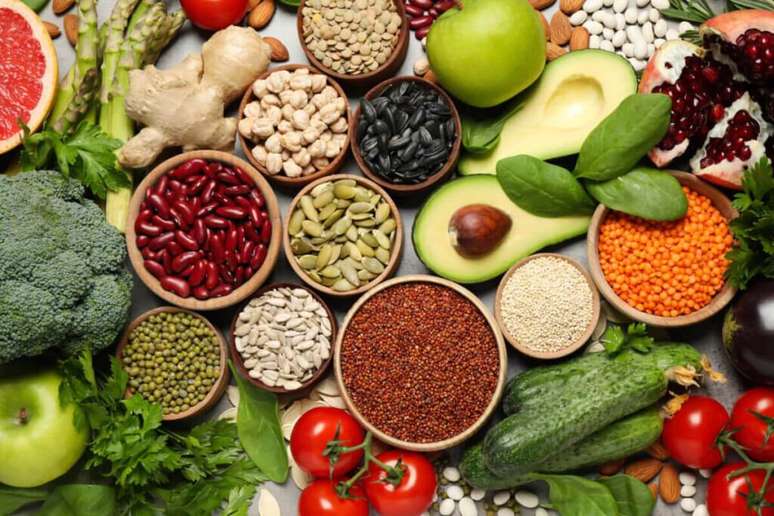The doctor explains how an anti-inflammatory diet can promote health and help prevent disease
An anti-inflammatory diet is a dietary proposal that aims to reduce chronic inflammation. Nutritionist Dr. Marianna Magri explains that when our body is inflamed, several changes occur in our body that indicate something is wrong. This ends up reducing the quality of our life. Some signs that there may be inflammation in the body are irregularities in the intestines, energy fluctuations, excess oil on the skin, causing pimples and even dark circles.
“The anti-inflammatory diet is not a specific regime, but an eating style. In essence, […] aim for a menu rich in healthy fats (olive oil, walnuts, almonds, avocado, fish), nutrient-rich foods (fruits, vegetables and legumes), carbohydrates with a low glycemic load, such as tubers, and foods that come from the earth , such as cassava, sweet potatoes, cabotiá squash, fresh herbs and spices”, underlines Dr. Marianna Magri.
Influence of eating habits
Studies of Harvard Health Publishing indicate that the eating habits they are able to strengthen the condition of inflammation in the body. Therefore, if you want to reduce or prevent inflammation, supplement your diet with nutrient-rich foods that contain antioxidants.
“Your anti-inflammatory diet should provide a healthy balance of proteins, carbohydrates, fats, vitamins, minerals and fiber, prioritizing foods with anti-inflammatory properties,” says Dr. Marianna Magri.
Furthermore, there are some foods that should not be on the menu, such as:
- Sugary drinks: sweetened soft drinks and fruit juices;
- Refined carbohydrates: bread, white pasta;
- Desserts: biscuits, sweets, cakes and ice creams;
- Processed meats: turkey breast, mortadella, sausages, etc.;
- Processed snacks and filled biscuits;
- Trans fats: foods with partially hydrogenated ingredients;
- Alcohol: beer, gin, vodka etc.
Foods that cannot be missing from the anti-inflammatory diet
Next, check out some foods you can add to your anti-inflammatory diet and learn how they benefit the body.
1. Purple grapes
Grapes contain resveratrol, vegetable compound with anti-inflammatory and antioxidant properties. Additionally, they can help reduce the risk of several diseases, including heart disease, type 2 diabetes and obesity.
two. Red fruits
Red fruits, whether blueberries, strawberries, raspberries or blackberries, contain several essential micronutrients, such as fiber and antioxidants, which help fight inflammation. “Not only do they reduce existing inflammation, but they also prepare the cells to respond better to any future inflammation,” explains Dr. Marianna Magri.

3. Omega 3
Salmon and other fatty fish are rich in the omega 3 (W3) fatty acids DHA and EPA. W3’s anti-inflammatory properties are notable for its role in the prevention and treatment of conditions such as coronary heart disease, diabetes, inflammatory bowel disease, Alzheimer’s disease, bipolar disorder, schizophrenia, and cystic fibrosis. W3 is also useful for autoimmune diseases such as lupus, rheumatoid arthritis, type 1 diabetes mellitus, ulcerative colitis, psoriasis and multiple sclerosis.
4. Turmeric
Turmeric, or turmeric, is a tasty yellow-orange spice. Among its components, called curcuminoids, the most important is curcumin. It is non-toxic and has a variety of therapeutic properties, including anti-inflammatory, antioxidantantimicrobial, hepatoprotective, immunostimulant, antiseptic and analgesic.
5. Green leaves
Spinach, kale, chard and arugula are rich in antioxidants, vitamins and nutrients, including folic acid, fibre, vitamins A, C, E and K. It is worth mentioning that the increase in fruit and vegetable consumption has been widely recommended as a key component of a healthy diet to reduce the risk of serious chronic diseases.
6. Avocado
Avocados are sources of healthy (monounsaturated) fats, which help reduce cholesterol and joint inflammation. They also contain vitamins K, C, E, manganese, selenium and zinc.
7. tomatoes
Tomatoes are a source of lycopene, the pigment that gives red and pink fruits, such as tomatoes, watermelons and strawberries, their distinctive color. It is a nutrient with antioxidant properties associated with health benefits, ranging from heart health to protection against sunburn.
8. Extra virgin olive oil
Olive oil contains approximately 36 phenolic compounds and it is this phenolic fraction that is responsible anti-inflammatory benefits, antioxidants and antimicrobials. The main anti-inflammatory effects of olive oil are mediated by antioxidants. The main one is oleocanthal, which has been shown to act similarly to ibuprofen, an anti-inflammatory drug.
9. Wheezing
Chia seeds are known as a superfood. They offer all nine essential amino acids and are therefore a high-quality plant protein. More than 80% of the carbohydrate content of seeds is in the form of fiber.
“This fiber can be fermented in the intestine, promoting the formation of fatty acids and improving colon health. Another important characteristic of chia is its high omega 3 content. Chia, in fact, is the best-known plant source of W-3, even better than flax seeds”, concludes Dr. Marianna Magri.
Marianna Magri
Doctor certified by the Brazilian Medical Association and the Brazilian College of Radiology and nutritionist – training at the Albert Einstein Food and Health Hospital (Stanford). She has been operating in the health market for over five years and has always been passionate about cooking and healthy eating. Today you are a reference in imaging diagnosis and weight loss, with more than 8 thousand hours of service and cases successful when it comes to advanced weight loss.
By Gabriela Dallo
Source: Terra
Ben Stock is a lifestyle journalist and author at Gossipify. He writes about topics such as health, wellness, travel, food and home decor. He provides practical advice and inspiration to improve well-being, keeps readers up to date with latest lifestyle news and trends, known for his engaging writing style, in-depth analysis and unique perspectives.


-sl6oy2p06omu.png)


![New Day ahead: A burdensome, franc, losing control … which awaits you until August 25, 2025 [SPOILERS] New Day ahead: A burdensome, franc, losing control … which awaits you until August 25, 2025 [SPOILERS]](https://fr.web.img6.acsta.net/img/a5/23/a523eff7de1e2b5906e9eda48d08e180.jpg)

![Such an excellent sun in advance: Summary of the episode on Monday, August 25, 2025 [SPOILERS] Such an excellent sun in advance: Summary of the episode on Monday, August 25, 2025 [SPOILERS]](https://fr.web.img4.acsta.net/img/d4/f7/d4f7205d1d5c20b03112603176615360.jpg)
